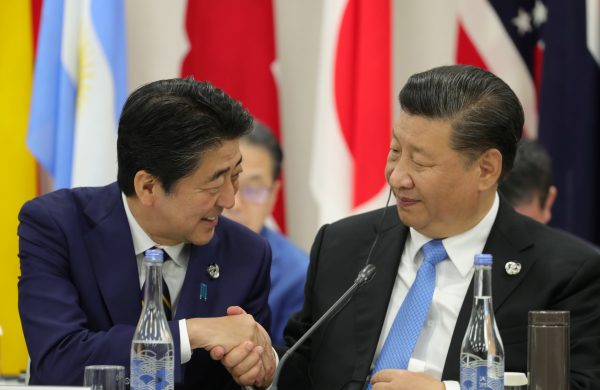For the first time in Japanese history, Abe committed to centralising decision making on security matters. This move aimed to ensure that Japan’s security policy aligned with the national interest. There were two identified security threats — China’s regional military tactics and North Korea’s nuclear missile testing. Abe ensured increases in defence spending and upgraded defence policy, resulting in the acquisition of new weapons and effectively changing Japan’s historical foreign policy and maritime positioning.
Abe inherited a difficult political climate when he came to power. Relations with China had deteriorated due to territorial disputes over the Senkaku Islands in the East China Sea. In his first years, Abe visited every ASEAN country and used the 2014 Shangri La Dialogue to establish a new maritime order — becoming the ‘father of the Quadrilateral Security Dialogue’. His infamous visit to the Yasukuni Shrine in which Japan’s war criminals are entombed was a huge blow to his already tumultuous relations with China.
Abe’s China policy was more pragmatic than adventurous, especially in the post-2012 period. The multilayered diplomacy of investing significant resources in Southeast Asia and South Asia, including the Japan–European Union Economic Partnership Agreement, exemplified Abe’s calculated, proactive participation and leadership. Japan’s foreign policy towards the Mekong Region, though overshadowed by China’s presence, posed an alternative to China’s development strategy. The 2018 New Tokyo Strategy of Mekong–Japan Cooperation signalled the growing rifts between China and Japan.
Abe’s foreign policy efforts to reach out to Australia and India were an integral component of the ‘Japan is back’ phase. India’s importance as a balancing power in East Asia allowed Abe to grow non-traditional ties with New Delhi. Extending military ties with Canberra served a larger purpose of checking China’s expansionist policies in the Indian Ocean region. Abe’s inclusion of countries like Indonesia and Singapore as key partners sought to create shared interest in ensuring regional peace and stability and constructed an effective alternative to economic dependency on China.
Following Abe’s assassination, Chinese analysts were divided about his complicated legacy on China–Japan relations. Critics from both the political left and right portrayed Abe as a ‘pragmatic and sophisticated politician’ who tried to maintain the status quo in relations with China. This is despite a few misses, like the failed Trans-Pacific Partnership agreement, where Abe actively attempted to isolate China with the support of the Obama administration.
Tsinghua University Professor Jiangyong Liu argued that after Abe resigned from his prime ministership, he became close with secessionist Taiwan authorities. This is a complicated precedent for the Kishida administration to follow. Abe made many provocative remarks about Taiwan, calling the United States to make a concrete decision on whether it would defend Taiwan in the face of a Chinese military operation.
Japanese Prime Minister Fumio Kishida stated in his keynote address to the 2022 Shangri-La Dialogue that he is ‘determined to fundamentally reinforce Japan’s defence capabilities within the next five years and secure a substantial increase in Japan’s defence budget’. While talking about the implications of Russia’s invasion of Ukraine, he stressed that ‘Ukraine today may be East Asia tomorrow’. Without naming China, Kishida described the ‘security environment’ as increasingly severe and ‘pledged a new national security strategy for the country by the end of 2022’.
Whether or not Kishida will be able to continue Abe’s legacy of nurturing the Free and Open Indo Pacific, it remains to be seen if Tokyo can extend US–Japan ties and acknowledge India as a regional balancing power. But in recent statements made by Kishida at the 2022 Quad Leaders’ meeting in Tokyo, he stressed the importance of the Quad and pledged to extend infrastructural investments that ‘will be essential in promoting productivity and prosperity in this region’.
Tackling China and its nationalistic claims will be a challenging task for the Japanese government. Kishida has repeatedly emphasised that ‘we want to make this a constructive and stable relationship and with that in mind, I’ve talked over the phone with President Xi Jinping and we concurred on that view’.
Though the Japanese political landscape is bound to change, Abe’s legacy remains intact for now, with the Kishida government maintaining Japan’s policy of ‘pragmatic pacifism’ to ensure peace and stability in the region.
Upamanyu Basu is a PhD Scholar from the National University of Juridical Sciences, India. He currently works as Assistant Professor of Political Science at the Manav Rachna International Institute of Research and Studies, India. He also serves as non-resident fellow in the International Development and Security Cooperation, the Philippines.

